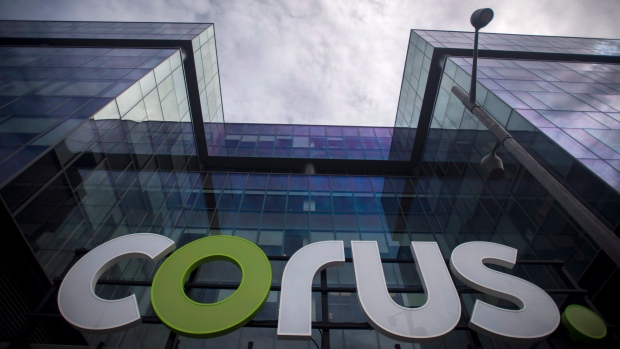Jun 27, 2018
Corus shares tumble to all-time low after company slashes dividend
The Canadian Press

TORONTO -- Consumers will see "fewer, better" specialty TV channels and more targeted advertising from Corus Entertainment, company executives said Wednesday as they explained their plan for rebuilding a media business that is struggling to adapt to intense competition, new viewing habits and changing technology.
"We anticipate a bumpy road over the short-term as our industry evolves," chief executive Doug Murphy said on a conference call after the company announced a $935.9-million loss and a dividend cut that helped push Corus stock to historic lows.
The stock closed down 18 per cent at $5.13 per class B share (CJRb.TO). It had earlier fallen as low as $4.96 per share on the Toronto Stock Exchange, the lowest on record since Corus went public in 1999.
Murphy told analysts that Corus is working with its regulated distribution partners -- Canada's cable, phone and satellite services -- to optimize revenue received from its top television channels.
Besides the Global Television network and conventional TV stations acquired from Shaw Communications in April 2016, the company has a number of specialty TV channels -- some long-standing Corus properties and some acquired when it bought Shaw Media for $2.65 billion in cash and stock.
Murphy said Corus uses a number of new technologies that employ some of the techniques that have given the internet giants such as Facebook and Google an advantage. The two companies capture about 80 cents of every advertising dollar collected by the media industry, he added.
"We now can build clear profiles of viewers as discrete, defined audience segments, such as SUV-ers or fashionistas, empty-nesters, deep pockets and many, many more," Murphy told analysts on a conference call.
"By profiling audience segments and the shows they love, TV can offer more targeted campaigns to our advertisers. This is fundamental to the future of television."
He added that Corus is using artificial intelligence "to process billions of amounts of data coming to set-top boxes to figure out what sort of cross-promotional strategies drive the most reengagement or viewership results."
Corus is also rolling out a system, called Cynch, that automates the advertising buying process.
Instead of selling ad space person-to-person by phone, Cynch enables computer-to-computer sales of ads associated with an inventory of programming on various media platforms.
"That is beginning to emulate our digital competitors in terms of selling our advertising solutions," Murphy said.
To the company's advantage, Murphy added, it has the ability to generate free cash flow (after dividends and debt payments), create content through its own studios, and top relationship in local television and radio markets.
"Local market relationships with our customers are time-tested, relationship-based and less prone to disruption by the duopoly of Facebook and Google."
However, analysts noted that revenue from the Corus television division in the third quarter declined more than expected despite a positive impact on local advertising from Ontario election advertising ahead of the June 7 vote.
Corus attributed the decline in TV revenue to national advertising, due to competition with Facebook and Google as well as "the realities of audience viewing levels."
Earlier, Corus announced its fiscal third-quarter net loss was equal to $4.49 per share for the quarter ended May 31 compared with a profit of $66.7 million or 33 cents per share a year ago.
The company's net loss included $1.01-billion in non-cash impairment charges. It attributed a $1 billion reduction in goodwill assets to its television division and $13.7 million to its radio licences.
On an adjusted basis, which excludes the impairment charge and other one-time items, Corus earned a profit of $78.1 million or 37 cents per share for the quarter compared with an adjusted profit of $70.1 million or 35 cents per share a year ago. Analysts on average had expected a profit of 36 cents per share, according to Thomson Reuters Eikon.
Revenue was $441.4 million, down from $461.6 million in the same quarter last year. Revenue from the television division fell 4.6 per cent to just under $403 million from $422.4 million, while radio revenue slipped 2.2 per cent to $38.4 million from $39.3 million.
In a separate move that will have a direct impact on Corus shareholders, the company said it will slash it dividends rate as of the 2019 financial year that begins Sept. 1 and direct savings of about $150 million per year towards debt reduction.
On a full-year basis, the dividend will drop to 24 cents per class B non-voting shares from $1.14 per share, where it had been since fiscal 2016. The dividend for class A voting shares, primarily held by the Shaw family, will drop to 23.5 per share from $1.135.


